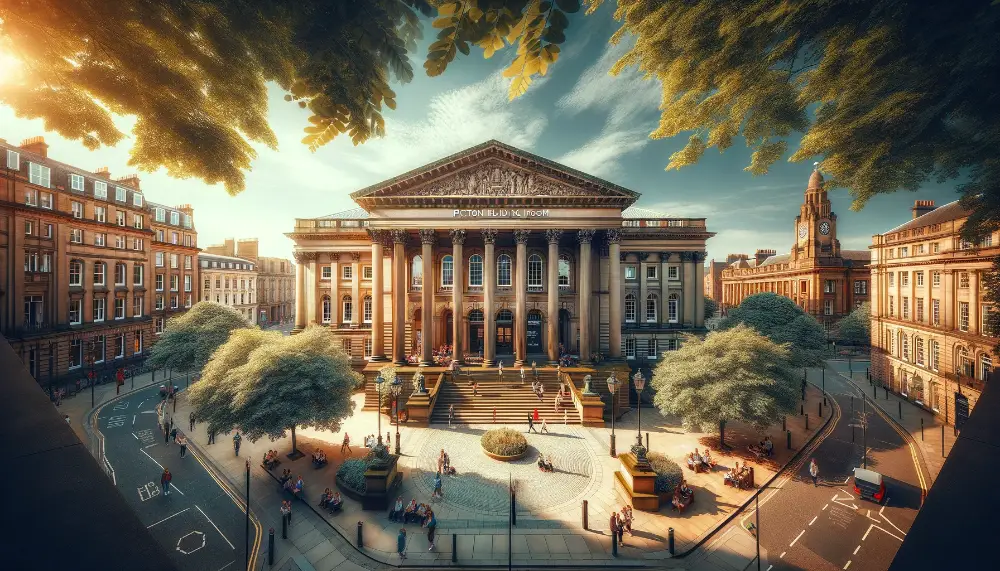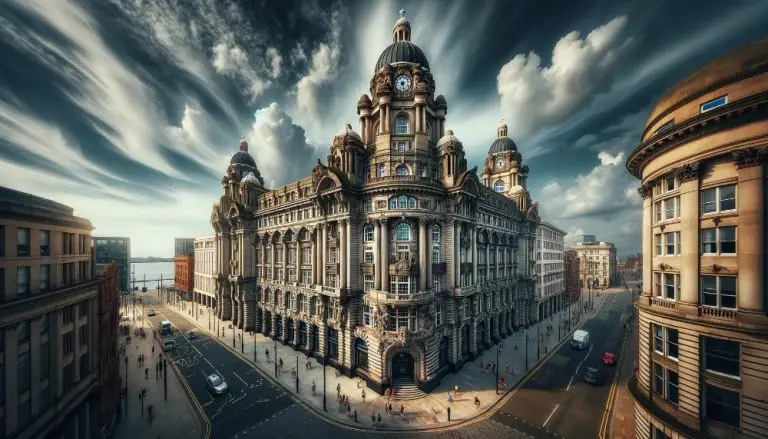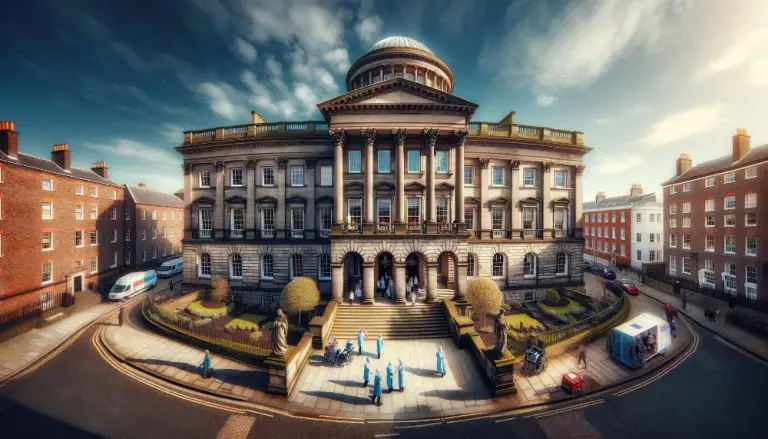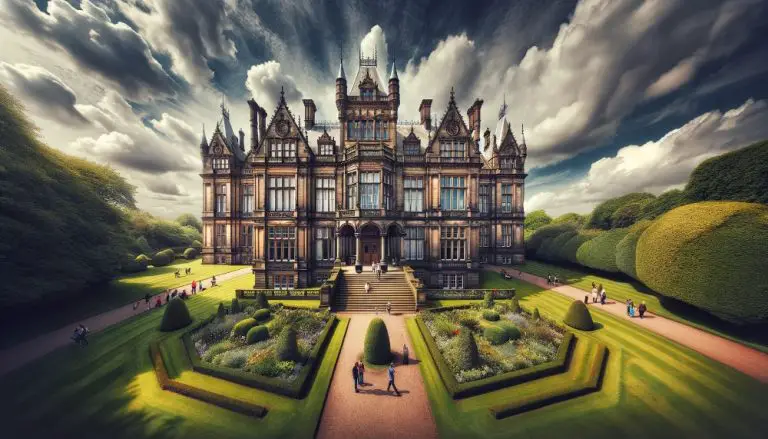Picton Reading Room and Hornby Library: Liverpool’s Historic Heritage Buildings

The Picton Reading Room and Hornby Library are two iconic heritage buildings nestled in the heart of Liverpool, England. As the name suggests, the Picton Reading Room and Hornby Library are esteemed institutions that offer much more than just an extensive collection of books. These historic buildings have stood the test of time, providing a haven for research, archives, and a peaceful reading space for book lovers and knowledge seekers.
The Picton Reading Room, completed in 1879 and named after Sir James Picton, boasts a striking semicircular frontage and majestic Corinthian columns that draw visitors in with their architectural allure. An architectural masterpiece, it evokes a sense of grandeur and elegance. In 1906, the Hornby Library was added to the premises, named after Hugh Hornby. Showcasing the Edwardian Imperial style, this architectural gem lies discreetly behind the Picton Reading Room, complementing its historic charm.
These two buildings are not just relics of the past; they serve as vibrant community hubs where the past and the present seamlessly merge. The libraries house an impressive collection of books, archiving knowledge from various genres and time periods. Beyond books, they also house rare documents, original photographs, maps, and newspapers, granting visitors a unique opportunity to delve into Liverpool’s rich history.
Both libraries are not just dedicated to providing information and resources; they also offer a range of modern amenities and services. Visitors can enjoy spacious study areas, equipped with library computers, ensuring that they have access to the latest technology for their research needs. The libraries are also equipped with wifi, printing facilities, scanning and copying services, and other conveniences to cater to the needs of the modern library-goer. Additionally, they provide essential amenities such as toilets and baby change facilities, ensuring the comfort of all visitors.
What truly sets the Picton Reading Room and Hornby Library apart is their commitment to community engagement. They are not merely quiet sanctuaries for individual research; they also host a variety of events, programs, and support groups. Visitors can attend digital skills courses, employment advice sessions, and social prescribing drop-in programs. Additionally, the libraries hold exhibitions throughout the year, showcasing diverse subjects and inviting visitors to explore new interests.
Overall, a visit to the Picton Reading Room and Hornby Library is not just an opportunity to explore Liverpool’s historic heritage, but also an invitation to unlock a world of knowledge and inspiration. Whether you are a book enthusiast, a researcher, or someone looking for a quiet space to read, the libraries provide a warm and welcoming environment that fosters a love for learning and discovery.
Tour of Picton Reading Room
Key Takeaways:
- The Picton Reading Room and Hornby Library are historic heritage buildings in Liverpool, England, known for their architectural beauty and significance.
- These libraries offer a vast collection of books, archives, rare materials, and resources, providing a rich source of knowledge and research opportunities.
- In addition to their extensive collections, the libraries provide various amenities such as study spaces, library computers, and printing facilities.
- The Picton Reading Room and Hornby Library also host a range of events, programs, and support groups that cater to the diverse needs and interests of the community.
- A visit to these libraries offers a chance to immerse oneself in Liverpool’s history, while also embracing the joys of reading and intellectual exploration.
Architecture and Design
The Picton Reading Room and Hornby Library, located in Liverpool, showcase an exquisite blend of architectural styles that are sure to captivate visitors. These two historic buildings, designed by renowned architects, Cornelius Sherlock and Thomas Shelmerdine, boast unique features that make them architectural gems.
The Picton Reading Room, designed by Cornelius Sherlock, draws inspiration from the iconic British Museum Reading Room. It features a striking semicircular frontage and elegant Corinthian columns that add grandeur to its exterior. The meticulous design of this building evokes a sense of reverence and awe, making it a standout attraction in Liverpool.
On the other hand, the Hornby Library, designed by Thomas Shelmerdine, is located behind the Picton Reading Room and showcases the Edwardian Imperial style. Stepping inside this remarkable library, visitors are greeted with a luxurious interior that reflects the opulence of the era. The architectural details and ornate decorations create a truly immersive experience, offering a glimpse into the rich history of Liverpool.
“The Picton Reading Room and Hornby Library stand as testaments to the skill and vision of their respective architects. Their architectural magnificence serves as a reminder of the city’s rich heritage and commitment to preserving its cultural treasures.”
Architectural Features:
- Semicircular Frontage: The Picton Reading Room boasts a semicircular frontage that not only adds to its visual appeal but also optimizes natural lighting.
- Corinthian Columns: The grand Corinthian columns that adorn the Picton Reading Room elevate its architectural splendor, paying homage to classical design principles.
- Edwardian Imperial Style: The Hornby Library exudes elegance with its Edwardian Imperial style, characterized by lavish interiors and intricate detailing.
Visiting the Picton Reading Room and Hornby Library is not just a journey into Liverpool’s architectural past, but an opportunity to immerse oneself in the beauty and grandeur of these iconic structures.
Collections and Resources
The Picton Reading Room and Hornby Library offer an impressive collection of books, rare books, archives, original documents, photographs, maps, and newspapers. Combined, these two libraries house approximately 15,000 volumes, providing a diverse range of reading materials for visitors to explore.
The archives at both the Picton Reading Room and Hornby Library are truly remarkable. They contain a vast array of original documents, some of which date back to the 13th century. These documents offer a unique glimpse into the lives and histories of the people of Liverpool throughout the ages.
“The Picton Reading Room and Hornby Library provide a treasure trove of knowledge, with books, rare collections, and historic archives that allow researchers to delve deep into Liverpool’s past.”
Furthermore, the libraries boast an extensive collection of photographs, maps, and newspapers. These resources bring historical moments to life, allowing researchers to explore and understand Liverpool’s rich heritage in a visual and informative way.
| Collection | Quantity |
|---|---|
| Books | Approximately 15,000 volumes |
| Rare Books | A significant number of unique and valuable editions |
| Archives | A wealth of original documents dating back to the 13th century |
| Photographs | A wide range of historical images capturing Liverpool’s past |
| Maps | An extensive collection of maps depicting Liverpool’s development |
| Newspapers | A comprehensive archive of local and national newspapers |
The vast and varied collections at the Picton Reading Room and Hornby Library provide invaluable resources for researchers, historians, and book lovers alike. Whether you are delving into Liverpool’s past, researching a specific topic, or simply exploring the world of literature, these libraries offer a truly exceptional experience.
Facilities and Services
When visiting the Picton Reading Room and Hornby Library, you can expect a range of excellent facilities and services designed to enhance your experience:
Study Spaces and Library Computers
With four floors of seating available, there are ample study spaces for individuals and groups to utilize. Additionally, there are 130 library computers, some of which can be pre-booked to ensure accessibility.
Quiet Study Space
The Picton Reading Room offers a dedicated quiet study space on the first floor. This serene environment allows you to focus and concentrate without distractions, providing an ideal setting for in-depth research, writing, or studying.
Wifi
Stay connected during your visit with free wifi available throughout both libraries. Whether you need to access online resources, conduct research, or simply browse the web, you can do so seamlessly and efficiently.
Printing, Scanning, and Copying
The libraries provide multi-functional devices that enable printing, scanning, and copying services. Whether you need to print out documents, scan pages from books, or make copies of important materials, these facilities are readily available to assist you.
Toilets and Baby Change Facilities
Both the Picton Reading Room and Hornby Library have well-maintained toilet facilities for your convenience. Additionally, baby change facilities are available, ensuring a family-friendly environment for visitors with young children.
Meeting Rooms
If you require a private space for meetings, presentations, or group discussions, meeting rooms can be hired at the libraries. These versatile and well-equipped spaces provide a professional setting for various types of gatherings.
| Picton Reading Room | Hornby Library | |
|---|---|---|
| Study Spaces | ✓ | ✓ |
| Library Computers | 130 (pre-bookable) | – |
| Quiet Study Space | ✓ | – |
| Wifi | ✓ | ✓ |
| Printing, Scanning, Copying | ✓ | ✓ |
| Toilets | ✓ | ✓ |
| Baby Change Facilities | ✓ | ✓ |
| Meeting Rooms | ✓ | ✓ |
Conclusion
The Picton Reading Room and Hornby Library in Liverpool, England, are much more than just historic buildings. These iconic structures not only preserve the city’s heritage but also provide an invaluable research and reading space for book lovers and researchers alike. With their extensive collection of books, rare materials, archives, and resources, these libraries offer a unique and enriching experience for those seeking knowledge and information.
Visiting the Picton Reading Room and Hornby Library not only allows you to explore Liverpool’s fascinating history but also opens doors to a world of books and learning. Immerse yourself in the tranquil reading spaces, indulge in the wealth of resources, and participate in the dynamic events and exhibitions. These iconic buildings truly embody the essence of a community hub, fostering a love for literature, research, and shared experiences.
FAQ
What is the Picton Reading Room and Hornby Library?
The Picton Reading Room and Hornby Library are two grade II* listed buildings located in Liverpool, England. They are historic buildings that house a vast collection of books, archives, and rare materials, providing a unique research and reading space for the community.
Who designed the Picton Reading Room and Hornby Library?
The Picton Reading Room was designed by Cornelius Sherlock, while the Hornby Library was designed by Thomas Shelmerdine.
What can I find in the Picton Reading Room and Hornby Library?
The libraries house a vast collection of books and rare books, as well as archives that date back to the 13th century and contain original documents, photographs, maps, and newspapers.
What facilities and services are available at the Picton Reading Room and Hornby Library?
There are four floors of seating, library computers, a quiet study space, free wifi, printing, scanning, and copying facilities, toilets, baby change facilities, and meeting rooms available for hire.
What kind of events and programs are hosted at the Picton Reading Room and Hornby Library?
The libraries host events such as a social prescribing drop-in, digital skills courses, support groups, employment advice helpdesk, exhibitions, and Shared Reading PLUS sessions.
Source Links
- https://en.wikipedia.org/wiki/Picton_Reading_Room_and_Hornby_Library
- https://liverpool.gov.uk/libraries/explore-central-library/central-library/
- https://www.gpsmycity.com/attractions/picton-reading-room-hornby-library-40375.html
- The History Behind Liverpool’s You’ll Never Walk Along - February 16, 2024
- The History of Everton FC - February 16, 2024
- The History of Liverpool FC - February 16, 2024






